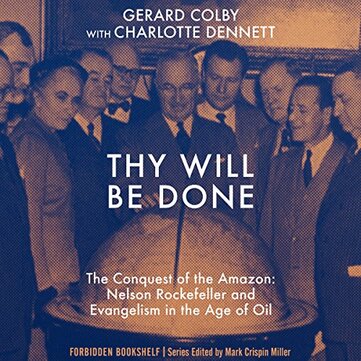Thy Will Be Done: The Conquest of the Amazon: Nelson Rockefeller and Evangelism in the Age of Oil10/8/2022  In the late 1940s, as oil companies were scouring the globe for new reserves, one man saw an opportunity in a remote corner of South America. That man was Nelson Rockefeller, and the place was the Amazon Basin. Rockefeller realized that if he could gain control of the region’s oil reserves, he would be in a position to dominate the world’s energy supply. But there was a problem: the Amazon was inhabited by millions of indigenous people who had no contact with the outside world. In order to gain access to the Amazon’s oil, Rockefeller would need to build a network of roads and pipelines through some of the most untouched rainforest on the planet. And to do that, he would need the support of Evangelical missionaries. In this blog post, we will explore how Nelson Rockefeller used Evangelical missionaries to help him achieve his goal of conquering the Amazon Basin. We will also examine the role that oil has played in shaping the history of South America. Nelson Rockefeller and the Conquest of the Amazon In the early 1940s, Nelson Rockefeller, then a young man working for his father's Standard Oil Company, was dispatched to South America to find new sources of crude oil. He soon realized that the Amazon basin was rich in oil and gas reserves. But developing these reserves would require the construction of roads and pipelines through some of the most remote and inaccessible regions on earth. Rockefeller set out to build a modern infrastructure in the Amazon, including roads, bridges, airports, and hospitals. He also founded the University of Brazil and helped create an agricultural research center in the rainforest. In doing so, he brought modernity to a largely untouched part of the world. But Rockefeller's legacy is not without its controversy. His development projects often displaced indigenous communities and destroyed large tracts of rainforest. And his close ties to US government agencies allowed him to further American political and economic interests in the region, sometimes at the expense of local people. Today, Nelson Rockefeller is remembered as both a visionary builder and a ruthless exploiter. His story provides a fascinating window into the history of oil development, evangelism, and globalization in the Amazon Basin. The Age of Oil The Age of Oil is a time when big business and government work together to exploit natural resources for their own gain. This time period is named after the oil industry, which rose to prominence in the late 19th and early 20th centuries. The Age of Oil was a time of great wealth and power for those who controlled the industry, but it was also a time of great exploitation and environmental destruction. In the early days of the oil industry, companies like Standard Oil exerted a great deal of control over the market. They used their power to crush competitors and drive up prices. They also used their influence to get favorable treatment from governments. In some cases, they even helped to overthrow governments that were not friendly to their interests. The Age of Oil saw the rise of powerful men like John D. Rockefeller and Nelson Rockefeller. These men were able to amass enormous fortunes by controlling the oil industry. They used their wealth to buy political influence and further their business interests. The Rockefellers were also active in philanthropy, using their money to support education and other causes. The Age of Oil was a time of great progress for humanity, but it was also a time of great destruction. The oil industry had a Evangelism In The Age Of Oil When one hears the word "evangelism," they may think of missionaries going to foreign lands to share the gospel. However, evangelism is not just about sharing the good news of Jesus Christ; it is also about social justice. In the age of oil, evangelism takes on a new meaning. The discovery of oil in the Amazon rainforest has had a profound impact on its indigenous people. For centuries, they have lived in harmony with nature, but now their way of life is being threatened by the greed of oil companies. These companies want to exploit the Amazon's resources without regard for the people who live there. In response to this threat, many Christians have taken up the cause of environmental justice. They are working to protect the Amazon and its people from the destructive effects of oil extraction. This work is often called "Evangelism in the age of oil." Christians who are engaged in this work believe that it is their duty to care for God's creation and defend those who are most vulnerable. They see their work as an extension of the gospel mandate to love our neighbors as ourselves. The issue of environmental justice is complex, and there are no easy answers. But Christians who are committed to In his book, Thy Will Be Done, Smith provides a detailed and fascinating account of how Rockefeller used his power and influence to spread Evangelical Christianity throughout the Amazon Basin in the hopes of creating a "Pax Americana" In South America. Although Rockefeller's efforts ultimately failed, they provide a valuable case study in the way that religion and politics can intersect in unexpected ways. Bellow is a conversation with Charlotte Dennett the Author of "Thy Will Be Done," a book victim of "privishing," (when a publisher intentionally suppresses a book that might be embarrassing and that they may have published in the first place). Thy Will Be DoneiV7Cs
|
certainincomes.comIN ORDER TO GENERATE Archives
March 2023
Categories
All
|
 RSS Feed
RSS Feed